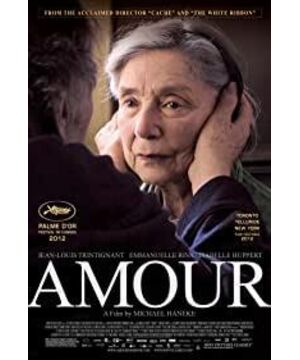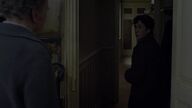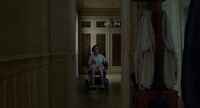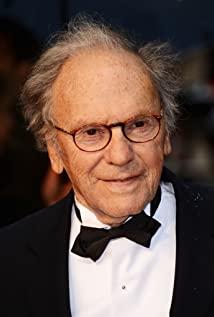After the "Humanity Trilogy", Haneke knew that in order to reveal love, it is not enough to discover the true face of human nature, so he sacrificed the banner of death, which made him rape the audience as always. , also engages our eyes in this offensive intrusion.
"Love" is a huge subject, and Haneke puts "Death" on the opposite side of it to add weight. How should love behave in the face of death? Grief? mercy? Or to love as always? The film's homage is that it's a lengthy presentation and a real restoration, so we have to forgive the film's slow pace and extreme restraint, just like you can't force an old man to walk fast. Death is approaching, but time has become extraordinarily long. Talking, eating, flipping through photo albums, practicing walking... Haneke gave all of this the utmost respect by silently watching with long shots. For the film itself, it's easy to slip into sentimentality and kitsch, but Haneke doesn't pull off tears for tears. He said that the heavier the thing, the more light-handed it is to build.
As for the presentation of characters, like the minimalist style of the film itself, it is shaped by a method that is almost line drawing. The heaviest parts of the film mostly focus on George's inner conflict. For George, "love" is first and foremost love for Anne. And the beauty of love lies in an unfamiliar passion, but George and Anne have lived together all their lives, and they are as familiar with each other's bodies as they are with their own fingernails. Life no longer gives surprises, but sudden tediousness. Love has become as dispensable as the underwear on an old woman. In fact, at this time, it is not so much love as it is a kind of inertia. The nurse scene appears in the film, like ice water poured into a basin of warm water. The nurse rudely scrubbed Annie's body and combed her hair skillfully and rudely. They couldn't understand how the body of an old man who had lost his dignity and ability and could only be at the mercy of others had to show what little was left in their hearts. care. They are only faced with their work, not a feeling of empathy. On the contrary, it is George who is suffering, and he is facing the process of loss almost all the time. The nurse helped Annie take a bath, and he watched in pain. The cloak of death made the body of his feelings ugly. This returned to the previous proposition, what should love look like in the face of death? This kind of heaviness makes the audience unbearable. The slow and cruel strangulation process is Haneke's sacrifice in the name of love.
The cinematic peeping perspective is always there. Haneke is good at giving the audience the greatest power to spy and know. So while he is showing the truth, he is also observing our expressions and hearts. The film uses great brush and ink to show the two old people's dependence on each other, quiet environment, closed apartment, attitude of rejection, life without turbulence and extremely slow action, engaging in the sound of no small and small to the delicate still oil painting on the wall , all showing their isolation and undisturbed nature. But the eyes of the audience are always there. We watch the passing of life and death, but we can't take our eyes off it, like a sin that cannot extricate itself. So we still don't know whether to be angry or sad.
The closer to the end of the film, the less love is left, and the more death and loneliness. The wear and tear of patience also made George finally break out and completely free, and the meaning of life was also lost. The movie doesn't present George's death, it just gives the audience a tender leeway after that pounding—and doesn't dissolve their love even after death. This blow really hits the nail on the head. It is completely outside of morality and common sense, but it is cleaner and truer than all oaths.
View more about Amour reviews











